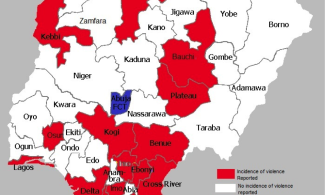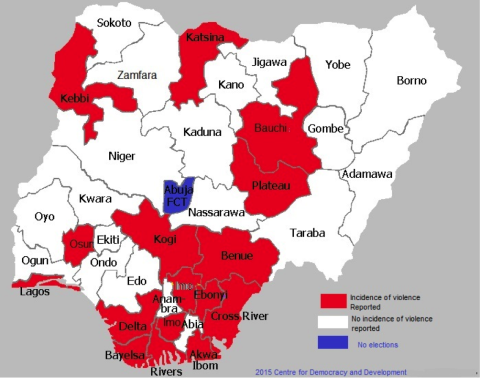
Overall, these negative trends would appear to have compromised, in part, the credibility and legitimacy of the electoral processes and by extension, the electoral outcomes. Unless key political actors demonstrate a higher level of restraint and tolerance, our findings suggest the prevalence of fertile ground for dissent and possible rejection of results in several places. Several arrests have been made and cases of electoral violence and malpractice reported.

12 April 2015
For Immediate Release
Abuja – Nigeria
Matters arising from the Voting Phase during the Nigeria 2015 Governorship and State House of Assembly Elections
Introduction
Following the mostly punctual and orderly accreditation of voters, actual voting commenced on schedule across the 36 federal states of the country. Though voting was generally peaceful, there were incidents that could significantly undermine the overall democratic quality of the elections. Notably, serious cases of election violence and violation of the election guidelines in some states, particularly Akwa Ibom, Lagos and Rivers states, to mention a few, are detrimental to the credibility of the electoral processes and outcomes. The overall low level of voter turnout in the governorship and state assembly elections raises concerns over citizen engagement at the state and local level where government decisions are most directly felt. Nevertheless, the noticeable improvement in the performance of INEC in administering the elections, including early arrival of election officers and materials, together with the improved functionality of the Smart Card Readers (SCRs), points to the strengthening of election administration in Nigeria.
Electoral Processes and Procedures
On the whole, the electoral processes went well, with broad compliance with electoral regulations. In most areas, electoral officials and materials arrived polling units on time and the voting environment was generally well laid-out with supporting infrastructure. Election observers, security and party agents were present at most polling units without being intrusive. Their conduct during the exercise was generally evaluated as mature and professional. Voters also maintained orderliness across the country. These factors, together with the enhanced effectiveness of the SCRs boosted the success of the accreditation exercise, which was largely peaceful and completed on time; and in some instances earlier than scheduled. The subsequent phase of actual voting also started on time and was for the most part peaceful. One of the obvious successes of the exercise was INEC’s efficiency in addressing its technical challenges from the 28 March general elections.
Despite this positive outlook, however, there were noticeable lapses in the process in some places. For example, contrary to stipulated regulations, accreditation and voting were reportedly done simultaneously, in some units in Jos North LGA of Plateau state, Sabon Gari LGA in Kaduna state and Ideato South LGA in Imo state. It was also reported that in some places, some voters were disenfranchised as a result of the early closure of accreditation and the commencement of voting ahead of INEC’s stipulated time. This was said to be the case with prospective voters who arrived their polling units late, having stayed back in anticipation of violence as a result of tense political atmosphere in several parts of the country.
Voters and Political Party Behaviour
Overall voter turnout was low compared to the Presidential and National Assembly elections. This may be connected to several factors such as: the tense electoral environment across the country; pre-election violence; the false assumption that the desired ‘change’ has been attained with the outcome of the federal elections and will therefore automatically engender solutions to the problems of governance at the state level; possible voter exhaustion from the emotionally-charged presidential elections; and the thinking of some voters that their votes would not influence the final outcome. Much as the electoral processes and procedures were found to be largely satisfactory, the conduct of the political parties, particularly the Peoples’ Democratic Party (PDP) and All Progressives Congress (APC), was less so. The high level of reported cases of hijacking of election materials and confrontations between politicians and their party supporters led to the disruption of the election process in many areas.
Violence and Conflict
Several cases of electoral violence were reported in many states. These include rampant snatching of ballot boxes, assault, arson, killings and destruction of election materials. Among several reported incidents, ballot box snatching occurred in polling units in Jos North LGA in Plateau state, Ihitte-Uboma in Imo state and in Sumaila LGA of Kano state where card readers were also snatched. Other cases of ballot snatching, gun-shots and harassment of voters occurred at polling units in Makurdi, Benue state. Similarly, youths in Brass LGA of Bayelsa state reportedly disrupted voting activities over protest that electoral materials be counted and that the Electoral and the Collation Officers produce the result sheets before voting commences. There was reported violence in Boki LGA of Cross River state, where voters were scared away by gunshots while electoral materials were carted away.
In Yakurr LGA of Cross River state, two people were reportedly shot dead and in Jos North, a young male was also reportedly killed by a security agent. Six fatalities were recorded in Nsit Atai LGA of Akwa Ibom state. In Rivers state, five people were reportedly killed, including a police officer. In Plateau state, two people were allegedly killed, including one shot by a soldier. In Kebbi state, the military reportedly killed four people during the elections and in Bayelsa state, five PDP leaders were reportedly kidnapped by gunmen. Overall, over 40 people were reportedly killed across the country.
The situation in Rivers state was particularly disturbing. Besides reports of killings, there were also cases of arson, attacks on INEC officials and hijacking of electoral materials. For example, the INEC RAC Centre in Buguma LGA and the house of the Rivers state Commissioner of Women Affairs were reportedly set ablaze and in Asari Toru LGA, seven vehicle transporting electoral materials were reportedly burnt. Additionally, in Gokana LGA, men in fake military uniform with identity cards were apprehended by the police. This high level of violence and disruptions of the electoral process were witnessed in Akwa Ibom State as well. These happenings raise questions around the quality of the elections and validity of the final outcomes.
Conduct of Security Agents
Generally, the conduct of security agents had a positive impact on the electoral process. Apart from providing security for the movement of INEC officials and electoral materials, their intervention thwarted electoral violence in many areas and facilitated the overall peaceful conduct of the exercise.
However, there were some cases of complicity of security agents in disrupting the exercise. Serious cases of electoral fraud and violence in several states, particularly Rivers state, were reported to have occurred with the active connivance of security agents. There was also a case of the harassment and intimidation of some journalists in Rivers state. It was also noted that security agents maintained passive disposition in the face of clear breaches of electoral procedures.
Concluding Remarks
On the positive side, the conduct of the governorship and state house of assembly elections was generally peaceful and orderly. With few exceptions, election officials and materials arrived polling units on time. The card readers were also effectively deployed across the country and voter behaviour was commendable. Overall, INEC made noticeable improvements in the administration of the exercise. However, the high level of violence, particularly in Rivers, Lagos, Akwa Ibom, Bayelsa, Ebonyi and Kebbi states is very worrisome. It is an attestation to the high level of political brigandage ravaging the political system for which the political class must shoulder the bulk of the responsibility. The connivance of security agents in some areas represents another worrying dimension.
Overall, these negative trends would appear to have compromised, in part, the credibility and legitimacy of the electoral processes and by extension, the electoral outcomes. Unless key political actors demonstrate a higher level of restraint and tolerance, our findings suggest the prevalence of fertile ground for dissent and possible rejection of results in several places. Several arrests have been made and cases of electoral violence and malpractice reported. It is imperative that the electoral laws setting out the penalties for electoral offences be fully implemented and offenders prosecuted as a deterrent. Given the lack of precedents of prosecutions for electoral offences in Nigeria, the activation of penalties for malpractice in this historical election will represent another important milestone in the country’s democratic development.
Signed
Idayat Hassan
Director